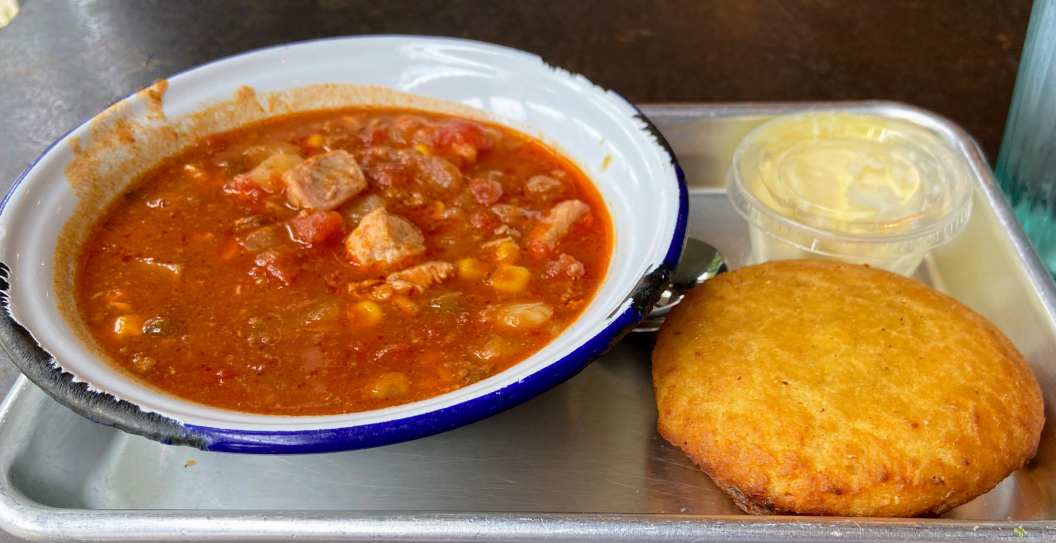Despite it being a staple of Kentucky cuisine, the origins of burgoo remain up for debate nearly two centuries after its creation. While it likely came from a porridge-like substance that nourished Scottish and French sailors on their journey to the new world, its rise to prominence in the American South — specifically Kentucky — is largely credited to French chef Gustav Jaubert, who earned the moniker of "Burgoo King."
Following Jaubert's death, the moniker was passed on to Lexington's James T. Looney. That eventually inspired the name of the racehorse "Burgoo King," which would go on to win the first two legs of the Triple Crown — including the Kentucky Derby — in 1932. The title now rests with Frankfort native Russ Kennedy, a "retiree" who was first introduced to the delicacy as a teenager while helping James Conway, the local "Burgoo King" who preceded him, cook at a nearby Veterans of Foreign Wars (VFW) post.
What is Kentucky Burgoo?
According to Kennedy, burgoo's recipe has always been open to interpretation. In its early days, it consisted of squirrel, rabbit, opossum and other bounties of the hunt; today, it features chicken, beef and pork. However, one constant has always been the community that's been attached to it, from feeding soldiers en masse to being on the menu at the Kentucky Derby, political rallies, church gatherings and other community events in the present.
"In a way, burgoo is like chili in that everybody makes it a bit differently," Kennedy tells Wide Open Country. "There is no one magical recipe. My beloved (albeit goofy) sister puts green beans and peas in hers. Blasphemy, I tell ya!"
Another constant is time. It's often said that the best things in life are never easy, and burgoo is no exception. The thick and soupy concoction has to be cooked for hours on end, with constant stirring to ensure its mix of meats coalesce properly. That constant monitoring, paired with the dish's community ethos, has only further tied together burgoo's past and present, helping to keep the dish alive as it evolves with time. According to Kennedy, that evolution has only led to it becoming more Kentucky-focused with each passing year.
"Burgoo is distinctly Kentucky," Kennedy says. "I have cooked and served burgoo to people from all across the U.S., Europe and Asia. It's a source of curiosity and unlike anything they've ever seen — or tasted! Outside of the Commonwealth, not only is burgoo hard to find, most people have no idea what it is. Folks farther south are typically familiar with Brunswick stew; but I have made burgoo's Southern cousin strictly following a credible recipe, and it doesn't even compare to genuine Kentucky burgoo."
Over time, several burgoo-focused events have been born statewide to celebrate and preserve the beloved meal as well as to keep its community roots going. They include Buffalo Trace Distillery's Oaks Day Festival, the Anderson County Burgoo Festival, and Owensboro's International Barbecue Festival (now called BBQ & Barrels). The latter is the biggest burgoo gathering in the state, drawing over 80,000 people annually to the city during the second weekend in May. The IBF also is where a young Kennedy began to get serious about making burgoo. It also made him appreciate the past, wishing he could've been there to man a pot of the hearty mix of meats and veggies for himself.
"I often envision myself manning a gigantic cast-iron pot at a community harvest festival," Kennedy says. "Folks from across the county would bring what they had from their gardens and forests to contribute to the event, and ginormous pots would be tied off to trees as a precaution against tipping. There'd be paddlers standing on platforms and stirring continuously for two to three days. How cool that must've been!"
Nowadays, you can find burgoo everywhere, from the aforementioned festivals to Lexington's Keeneland horse racing track and auction complex, Mark's Feed Store and homesteads throughout the Commonwealth, each with its own twist, taste and story. (It's even served at the world-famous Kentucky Derby.) That versatility is a driving force behind what has kept burgoo around for close to 200 years after its creation despite the arduous cooking process to make it. Because of this, Kennedy says he never misses an opportunity to try a burgoo when he comes across it, although he jokingly admits that "I have never run into any as good as mine."
"Burgoo is part of who we are as Kentuckians and will forever be associated with public gatherings and celebrations," Kennedy says. "Very few people fool with it anymore, I suppose because it's so time-consuming. To get it right takes all day. I would hate for burgoo to fade into the annals of culinary history. How sad that would be."




